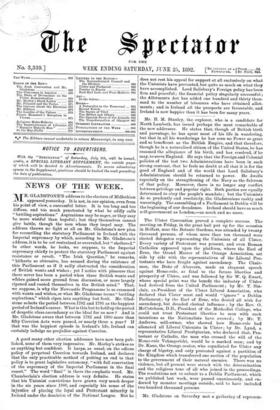NEWS OF THE WEEK.
MR. GLADSTONE'S address to the electors of Midlothian appeared yesterday. It is not, in our opinion, even from his point of view, a successful letter. It is too long and too diffuse, and too much penetrated by what he oddly calls "battling aspirations." Aspirations may be eager, or they may be more wistful than hopeful ; but they themselves cannot give battle, though the men whom they impel may. The address throws no light at all on Mr. Gladstone's new plan for reconciling the statutory Parliament in Ireland with the Imperial supremacy by which, according to Mr. Gladstone's address, it is to be not restrained or overruled, but " sheltered." In other words, he looks, we suppose, to the Imperial supremacy chiefly to protect the statutory Parliament against resistance or revolt. " The Irish Question," he remarks, " hitherto so obtrusive, has seemed during the existence of this Parliament as if it sadly obstructed the consideration of British wants and wishes ; yet I notice with pleasure that there never has been a period when these British wants and wishes gained more ground from discussion, or more largely ripened and rooted themselves in the British mind." That, we suppose, is why the Newcastle Programme is so crammed with wants and wishes, or what Mr. Gladstone terms " battling aspirations," which ripen into anything but fruit. Mr. Glad- stone selects the period between 1782 and 1795 as the happiest period of Ireland's career. What is this but to hold up the period of despotic class-ascendancy as the ideal for us now ? And is Mr. Gladstone aware that between 1782 and 1800 more than fifty Coercion Acts were passed, or nearly three a year? If that was the happiest episode in Ireland's life, Ireland can certainly indulge no prejudice against Coercion.


































